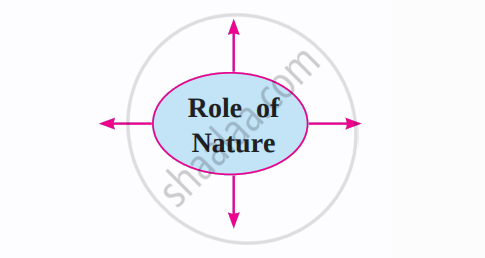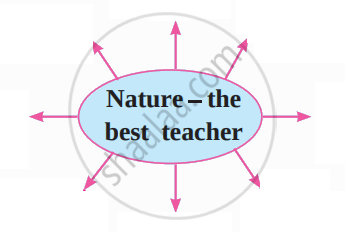Advertisements
Advertisements
Question
Divide the class into five groups. Discuss in the group the following points. Give one point to each group.
- Seeds regerminate from another seed.
- Plants and flowers wilt and become one with the earth.
- Cactii thrive in the desert region.
- Bare nature turns green in spring.
- Caterpillar turns into butterfly.
Each group will present their discussion in front of the class.
Solution
- Seeds are the reproductive body of the plants. They contain the root and the shoot of the plant. When a seed comes in contact with soil and water, the process of germination starts. The root goes deep into the soil while the shoot grows above the soil. This shoot then turns into a plant and the plant bears fruits and flowers. The fruits and flowers contain seeds. When these seeds go into the soil, the germination process starts all over again. This is how the life of a plant comes to a full circle and thus, seeds regerminate from other seeds.
- Plants and flowers have a limited life after which they start wilting. Once they start to wilt and fall to the ground, they go back to the soil due to the rainfall or the grazing animals in the area. Plants and flowers biodegrade and mix with the soil. They give back certain nutrients that help improve the quality of the soil. Humans can learn a lot from these plants and flowers as they do not refuse to accept change. They live happily and go back to nature with pride as it is important to live life fully.
- Cactus thrives in a climate that is dry and lifeless. It even grows flowers. It reminds us that life is not always easy and conditions can be difficult at times, but what we do in such tough times shows us and others what kind of a person we are. Therefore, the cactus teaches us to be ourselves no matter where we are and what condition we are in.
- Seasons come and go. It is a continuous cycle that has been going on nonstop since the dawn of time. Autumn is the season where the trees drop their leaves and are left uncovered. Many species of trees bear no flowers or fruits in Autumn and Winter. But as the Spring season sets in, the flowers begin to grow and the trees start bearing fruits. This shows us that change is the only constant in the world. No matter how things are today, tomorrow they will be better. Just like the trees are rewarded for their patience with fruits and flowers, we too will be rewarded if we are calm and patient. The only thing we need to remember when we are facing problems is that nothing stays forever and something good is waiting for us even if we are experiencing something bad right now.
- A caterpillar wraps itself up in a cocoon and roughly four weeks later, it comes out as a butterfly, but this process is very difficult. Just like the caterpillar, change is also necessary for humans. We should keep making ourselves better with time; instead of staying the same person we were five years ago. We can only hope to make the world a better place if we improve ourselves each day. Therefore, it is important that we use the knowledge that we gather, the people that we meet, and the experiences that we have to further develop ourselves.
APPEARS IN
RELATED QUESTIONS
Read the following passage and do the activities.
We have a hibiscus plant in our garden. Every fortnight a flower blooms on it - big, bright and tender. Through the day it smiles with the sun and dances with the wind, but as evening approaches, it starts wilting. The morning after, it withers completely and by evening it falls and becomes one with the earth again. The flower comes to life only for a day, yet it does so in full splendour. What if we too lived our life, however short, to its fullest?
We went to a rocky beach and saw the spread of the majestic ocean and the rocks alongside, carved, sculpted and shaped by the water. Water is so gentle, rock so hard, yet, as the water flows over it every day, for years, the rock gives in. It takes the shape that the water commands. Our problems are so colossal and we are so small, yet if we persist...
We saw small bits of grass peeping through the small cracks in a concrete pavement. It left us thinking: however impossible things may look, there is always an opening...
We saw a tree bare of all leaves in the cold winter months. We thought its chapter was over. But three months passed, spring set in and the tree was back to its green majesty once again, full of leaves, flowers, birds and life. What if we too had the conviction that, however difficult things are right now, it will not remain so for ever. Remember, this too shall pass.
(A1) Rewrite the following sentences in proper sequence. 02
(a) It starts wilting.
(b) Through the day, it smiles with the sun.
(c) It withers completely.
(d) Every fortnight a flower blooms.
(A2) Complete the following sentences. 02
(1) Our problems are ……………………….. .
(2) However impossible things may look ………………………………………..
(A3) Match the columns. 02
| A | B |
| (1) Drying and drooping | (a) Conviction |
| (2) Huge, massive | (b) Splendour |
| (3) Grandeur | (c) Colossal |
| (4) Firm belief | (d) Wilting |
(A4) (1) Do as directed. 02
(a) We went to the rocky beach and saw the spread of the majestic ocean. (Begin with ‘After going to….’)
(b) We have a hibiscus plant in our garden. (Write a question to which the underlined word is the answer).
(A5) What role does nature play in our lives? 02
Various aspects of Nature have special features that make them differ from one another.
For example, Birds:- appearance, shape, colour, size, food habits, habitat, sound etc.
Write such special features of each of the following.
- Land- _______________
- Water- ______________
- Trees- _______________
- Animals- ____________
- Insects- _____________
What things in nature teach us the following:
Nothing is impossible to achieve ____________.
What things in nature teach us the following:
Problems are not permanent ___________.
What things in nature teach us the following:
Be persistent ____________.
What things in nature teach us the following:
Many hands make work light ____________.
What things in nature teach us the following:
Delicate structures are not a sign of weakness ______.
Read the question from the lesson. What do they imply?
Are you listening?
Read the question from the lesson. What do they imply?
What if we too are consistent, organized, focused...?
Go through the lesson again and complete the flow-chart that highlights the life of a ‘hibiscus’ flower.

The writer explains the contrasting features of ‘water’ and ‘rock’ in the lesson. Write all the features of both water and rock in the given table.
| Water | Rock |
| 1. | 1. |
| 2. | 2. |
| 3. | 3. |
| 4. | 4. |
The writer bas very positively described the different things in nature. Discuss with your partner the special features of coach one of them. Add on the list.
| Part of Nature | Special feature | Value learnt |
| 1. Rainbow | ||
| 2. Caterpillar | ||
| 3. | ||
| 4. | ||
| 5. | ||
| 6. | ||
| 7. |
Think and answer in your own words.
How should you deal with difficulties and problems?
Think and answer in your own words.
How does nature succeed in its ‘Alchemy’? What can it turn a small person into?
Think and answer in your own words.
Which two aspects of nature teach us to accept change and adjust according to the situation?
Think and answer in your own words.
Why does the writer begin by quoting the lines from William Blake's poem 'Auguries of Innocence'?
Prepare a Fact file of any of the following plants/trees, using the points given.
[coconut / neem / basil / cactus / apple]
- Name of Plant/Tree _________
- Scientific name ___________
- Region and climate ___________
- Features ___________
- Growth _____________
- Size, shape and colour ____________
- Uses __________
- Any special feature ________
'Impossible' itself says 'I M possible'. Do you agree? Justify your answer by citing something that you have experienced or heard from someone.
Look at the following thing. Discuss with your friend, what you learn from them.
A bee
Look at the following thing. Discuss with your friend, what you learn from them.
An eagle
Look at the following thing. Discuss with your friend, what you learn from them.
A creeper
Look at the following things. Discuss with your friend, what you learn from them.
The river
The writer explains the contrasting features of ‘water’ and ‘rock’ in the text. Write all the features of both water and rock in the given table.
| Water | Rock |
| 1. | 1. |
| 2. | 2. |
| 3. | 3. |
| 4. | 4. |
Impossible itself says ‘I M possible’. Do you agree? Justify your answer by citing some examples from the text and some that you have experienced or heard from someone.
Go through the text again and complete the web that highlights the various features of flower of the ‘hibiscus’ plant. One is done for you.

The author has very positively described the different things in nature. Discuss with your partner the special features of each one of them. Add on the list.
| Part of Nature | Special Feature | Value Learnt |
| 1. Water | ||
| 2. Rainbow | ||
| 3. Caterpillar | ||
| 4. | ||
| 5. | ||
| 6. | ||
| 7. | ||
| 8. | ||
| 9. | ||
| 10. |
Role of Nature: Discuss in pairs, the role played by nature and complete the web diagram.


